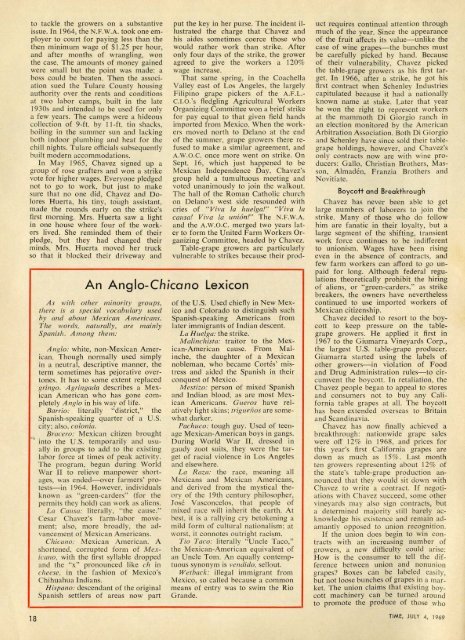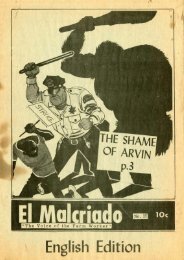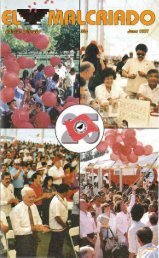Create successful ePaper yourself
Turn your PDF publications into a flip-book with our unique Google optimized e-Paper software.
<strong>to</strong> tackle <strong>the</strong> growers on a substantiveissue. In 1964, <strong>the</strong> N.F.W.A. <strong>to</strong>ok one employer<strong>to</strong> court for paying less than <strong>the</strong><strong>the</strong>n minimum wage of $1.25 per hour,and after months of wrangling, won<strong>the</strong> case. The amounts of money gainedwere small but <strong>the</strong> point was made: aboss could be beaten. Then <strong>the</strong> associationsued <strong>the</strong> Tu<strong>la</strong>re County housingauthority over <strong>the</strong> rents and conditionsat two <strong>la</strong>bor camps, built in <strong>the</strong> <strong>la</strong>te1930s and intended <strong>to</strong> be used for onlya few years. The camps were a hideouscollection of 9-ft. by II-ft. tin shacks,boiling in <strong>the</strong> summer sun and <strong>la</strong>ckingboth indoor plumbing and heat for <strong>the</strong>chill nights. Tu<strong>la</strong>re officials subsequentlybuilt modern accommodations.In May 1965, Chavez signed up agroup of rose grafters and won a <strong>strike</strong>vote for higher wages. Everyone pledgednot <strong>to</strong> go <strong>to</strong> work, but just <strong>to</strong> makesure <strong>that</strong> no one did, Chavez and DoloresHuerta, his tiny, <strong>to</strong>ugh assistant,made <strong>the</strong> rounds early on <strong>the</strong> <strong>strike</strong>'sfirst morning. Mrs. Huerta saw a lightin one house where four of <strong>the</strong> workerslived. She reminded <strong>the</strong>m of <strong>the</strong>irpledge, but <strong>the</strong>y had changed <strong>the</strong>irminds. Mrs. Huerta moved her truckso <strong>that</strong> it blocked <strong>the</strong>ir driveway andAn Anglo-Chicano LexiconAs with o<strong>the</strong>r minority groups,<strong>the</strong>re is a special vocabu<strong>la</strong>ry usedby and about Mexican Americans.The words, naturally, are mainlySpanish. Among <strong>the</strong>m:Anglo: white, non-Mexican American.Though normally used simplyin a neutral, descriptive manner, <strong>the</strong>term sometimes has pejorative over<strong>to</strong>nes.It has <strong>to</strong> some extent rep<strong>la</strong>cedgringo. Agringada describes a MexicanAmerican who has gone completelyAnglo in his way of life.Barrio: literally "district," <strong>the</strong>Spanish-speaking quarter of a U.S.city; also, colonia.Bracero: Mexican citizen brought" in<strong>to</strong> <strong>the</strong> U.S. temporarily and usuallyin groups <strong>to</strong> add <strong>to</strong> <strong>the</strong> existing<strong>la</strong>bor force at times of peak activity.The program, begun during WorldWar II <strong>to</strong> relieve manpower shortages,was ended-over farmers' protests-in1964. However. individualsknown as "green-carders" (for <strong>the</strong>permits <strong>the</strong>y hold) can work as aliens.La Causa: literally, "<strong>the</strong> cause."Cesar Chavez's farm-<strong>la</strong>bor movement;also, more broadly, <strong>the</strong> advancemen<strong>to</strong>f Mexican Americans.Chicano: Mexican American. Ashortened, corrupted form of Mexicano,with <strong>the</strong> first syl<strong>la</strong>ble droppedand <strong>the</strong> "x" pronounced like ch incheese, in <strong>the</strong> fashion of Mexico'sChihuahua Indians.Hispano: descendant of <strong>the</strong> originalSpanish settlers of areas now part18put <strong>the</strong> key in her purse. The incident illustrated<strong>the</strong> charge <strong>that</strong> Chavez andhis aides sometimes coerce those whowould ra<strong>the</strong>r work than <strong>strike</strong>. Afteronly four days of <strong>the</strong> <strong>strike</strong>, <strong>the</strong> groweragreed <strong>to</strong> give <strong>the</strong> workers a 120%wage increase.That same spring, in <strong>the</strong> Coachel<strong>la</strong>Valley east of Los Angeles, <strong>the</strong> <strong>la</strong>rgelyFilipino grape pickers of <strong>the</strong> A.F.L.c.I.O.'s fledgling Agricultural WorkersOrganizing Committee won a brief <strong>strike</strong>for pay equal <strong>to</strong> <strong>that</strong> given field handsimported from Mexico. When <strong>the</strong> workersmoved north <strong>to</strong> De<strong>la</strong>no at <strong>the</strong> endof <strong>the</strong> summer, grape growers <strong>the</strong>re refused<strong>to</strong> make a simi<strong>la</strong>r agreement, andA.W.O.C. once more went on <strong>strike</strong>. OnSept. 16, which just happened <strong>to</strong> beMexican Independence Day, Chavez'sgroup held a tumultuous meeting andvoted unanimously <strong>to</strong> join <strong>the</strong> walkout.The hall of <strong>the</strong> Roman Catholic churchon De<strong>la</strong>no's west side resounded withcries of "Viva <strong>la</strong> huelga!" "Viva <strong>la</strong><strong>causa</strong>! Viva <strong>la</strong> union!" The N.F.W.A.and <strong>the</strong> A.W.O.C. merged two years <strong>la</strong>ter<strong>to</strong> form <strong>the</strong> United Farm Workers OrganizingCommittee, headed by Chavez.Table-grape growers are particu<strong>la</strong>rlyvulnerable <strong>to</strong> <strong>strike</strong>s because <strong>the</strong>ir prodof<strong>the</strong> U.S. Used chiefly in New Mexicoand Colorado <strong>to</strong> distinguish suchSpanish-speaking Americans from<strong>la</strong>ter immigrants of Indian descent.La Huelga: <strong>the</strong> <strong>strike</strong>.Malinchista: trai<strong>to</strong>r <strong>to</strong> <strong>the</strong> Mexican-Americancause. From Malinche,<strong>the</strong> daughter of a Mexicannobleman, who became Cortes' mistressand aided <strong>the</strong> Spanish in <strong>the</strong>irconquest of Mexico.Mestizo: person of mixed Spanishand Indian blood, as are most MexicanAmericans. Gueros have re<strong>la</strong>tivelylight skins; triguefios are somewhatdarker.Pachuco: <strong>to</strong>ugh guy. Used of teenageMexican-American boys in gangs.During World War II, dressed ingaudy zoot suits, <strong>the</strong>y were <strong>the</strong> targe<strong>to</strong>f racial violence in Los Angelesand elsewhere.La Raza: <strong>the</strong> race, meaning allMexicans and Mexican Americans,and derived from <strong>the</strong> mystical <strong>the</strong>oryof <strong>the</strong> 19th century philosopher,Jose Vasconcelos. <strong>that</strong> people ofmixed race will inherit <strong>the</strong> earth. Atbest, it is a rallying cry be<strong>to</strong>kening amild form of cultural nationalism; atworst, it connotes outright racism.Tio Taco: literally "Uncle Taco,"<strong>the</strong> Mexican-American equivalent ofan Uncle Tom. An equally contemptuoussynonym is vendido, sellout.Wetback: illegal immigrant fromMexico, so called because a commonmeans of entry was <strong>to</strong> swim <strong>the</strong> RioGrande.uct requires continual attention throughmuch of <strong>the</strong> year. Since <strong>the</strong> appearanceof <strong>the</strong> fruit affects its value-unlike <strong>the</strong>case of wine grapes-<strong>the</strong> bunches mustbe carefully picked by hand. Becauseof <strong>the</strong>ir vulnerability, Chavez picked<strong>the</strong> table-grape growers as his first target.In 1966, after a <strong>strike</strong>, he got hisfirst contract when Schenley Industriescapitu<strong>la</strong>ted because it had a nationallyknown name at stake. Later <strong>that</strong> yearhe won <strong>the</strong> right <strong>to</strong> represent workersat <strong>the</strong> mammoth Di Giorgio ranch inan election moni<strong>to</strong>red by <strong>the</strong> AmericanArbitration Association. Both Di Giorgioand Schenley have since sold <strong>the</strong>ir tablegrapeholdings, however, and Chavez'sonly contracts now are with wine producers:Gallo, Christian Bro<strong>the</strong>rs, Masson,Almaden, Franzia Bro<strong>the</strong>rs andNovitiate.Boycott and BreakthroughChavez has never been able <strong>to</strong> get<strong>la</strong>rge numbers of <strong>la</strong>borers <strong>to</strong> join <strong>the</strong><strong>strike</strong>. Many of those who do followhim are fanatic in <strong>the</strong>ir loyalty, but a<strong>la</strong>rge segment of <strong>the</strong> shifting, transientwork force continues <strong>to</strong> be indifferent<strong>to</strong> unionism. Wages have been risingeven in <strong>the</strong> absence of contracts, andfew farm workers can afford <strong>to</strong> go unpaidfor long. Although federal regu<strong>la</strong>tions<strong>the</strong>oretically prohibit <strong>the</strong> hiringof aliens, or "green-carders," as <strong>strike</strong>breakers, <strong>the</strong> owners have never<strong>the</strong>lesscontinued <strong>to</strong> use imported workers ofMexican citizenship.Chavez decided <strong>to</strong> resort <strong>to</strong> <strong>the</strong> boycott<strong>to</strong> keep pressure on <strong>the</strong> tablegrapegrowers. He applied it first in1967 <strong>to</strong> <strong>the</strong> Giumarra Vineyards Corp.,<strong>the</strong> <strong>la</strong>rgest U.S. table-grape producer.Giumarra started using <strong>the</strong> <strong>la</strong>bels ofo<strong>the</strong>r growers-in vio<strong>la</strong>tion of Foodand Drug Administration rules-<strong>to</strong> circumvent<strong>the</strong> boycott. In retaliation, <strong>the</strong>Chavez people began <strong>to</strong> appeal <strong>to</strong> s<strong>to</strong>resand consumers not <strong>to</strong> buy any Californiatable grapes at all. The boycotthas been extended overseas <strong>to</strong> Britainand Scandinavia.Chavez has now finally achieved abreakthrough: nationwide grape saleswere off 12% in 1968, and prices forthis year's first California grapes aredown as much as 15%. Last monthten growers representing about 12% of<strong>the</strong> state's table-grape production announced<strong>that</strong> <strong>the</strong>y would sit down withChavez <strong>to</strong> write a contract. If negotiationswith Chavez succeed, some o<strong>the</strong>rvineyards may also sign contracts, buta determined majority still barely acknowledgehis existence and remain adamantlyopposed <strong>to</strong> union recognition.If <strong>the</strong> union does begin <strong>to</strong> win contractswith an increasing number ofgrowers, a new difficulty could arise:How is <strong>the</strong> consumer <strong>to</strong> tell <strong>the</strong> differencebetween union and nonuniongrapes? Boxes can be <strong>la</strong>beled easily,but not loose bunches of grapes in a market.The union c<strong>la</strong>ims <strong>that</strong> existing boycottmachinery can be turned around<strong>to</strong> promote <strong>the</strong> produce of those whoTIME, JULY 4, 1969





